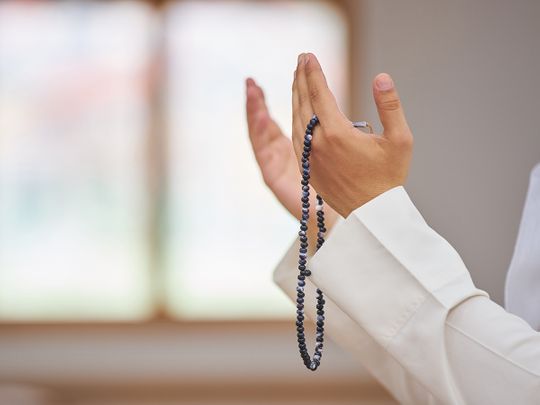
Ramadan is the month of the year that every believing Muslim looks forward to. Alongside being a special month in Islam, another aspect that underscores its significance is that during this month, the revelation of the Quran began in the 7th century A.D.
Ramadan is a month of contemplation on the Divine plan of creation, self-reflection on the life one has been leading, appreciating the value of peace within and around, and imbibing moral virtues in the ongoing process of personality development.
Every Muslim is obligated to fast throughout the month of Ramadan, “He desires you to fast the whole month, so that you may glorify Him for having guided you and so that you may be grateful to Him.” (Quran, 2:185)
A time for introspection
Fasting in this month is not just refraining from food and water from sunset until morning. Ramadan fasting is primarily about spirit, and spirit comes through introspection.
An act devoid of spirit will never lead a person to their real purpose. Prayers, for example, without the spirit of humility, would not achieve their aim, and Zakah, without the spirit of sharing, will merely be a form.
Ramadan is looked upon as the month of patience. Abstaining from food and water while focusing on personality development is the essence of the month. According to God’s creation plan, leading one’s life without exercising patience is nearly impossible.
God has given freedom to all human beings. Every individual has the option of misusing or appropriately using their freedom.
When people use their God-given freedom, others will likely encounter various issues. It is critical to have patience in such situations. In normal conditions, a person lives their life according to their preferences. But it is such unfavourable encounters that truly test a person.

A critical training period
Islam states that man is born on Earth to fulfil a pre-death term. The decision on the deeds man performs — good or bad — will occur on the day of judgement. That is why Ramadan becomes a critical training period to learn and imbibe patience.
According to a saying of the Prophet of Islam, fasting does not just mean abstaining from food and drink: fasting is, in reality, the act of abstinence from all inappropriate speech and action. A believer should lead a life of thankfulness to God.
The first chapter of the Quran begins with: ‘Alhamdulillah’. Those who utter these words mean to say: “We are grateful to God, the Lord of the Universe. “God is a giver, whilst a man is a taker."
But, man easily starts taking everything he experiences for granted. He does so as a matter of right. As a result, people incorrectly attribute their wealth to worldly success rather than from God; this belief often builds a mental barrier inside an individual, preventing him from sharing with the less fortunate.
In addition to observing the fasts, another essential aspect of Ramadan is Zakah or charity. During the month of fasting, it is binding on all believing Muslims to give alms.
Taking care of the weak
A community can only prosper when its individuals do not spend all their wealth on gratifying their needs and desires but instead set aside some for parents, relatives, neighbours, the poor, and the weak.
Therefore, a true believer should always be ready to aid others. The Zakah translates into a small percentage of annual contribution to the public welfare from one’s wealth or income after paying for what is necessary to support themselves and their family. Thus, every believing Muslim must give alms in the name of Zakah to perform this social and religious duty.
The Quran constantly exhorts Muslims to conduct worship and pay Zakah. It even goes so far as to argue that one cannot reach righteousness unless one spends one’s money for the love of God.
True message of Islam
The true measure of charity is not in giving away something we have rejected but in giving away something we value and cherish. It may be in any form — personal efforts, talents, skill, learning, property or possessions.
The Quran also guides a believer to follow the practice of Sadaqah, which is a comprehensive act of giving. It can range from a comforting word to a smile, a kind word, or a glass of water to a thirsty person.
As per tradition, giving Sadaqah in the holy month of Ramadan is important. Therefore, in this fasting month, almost everyone who can afford it should help the needy somehow.
The purpose of Ramadan is to boost a believer’s personality development process. However, the journey should not come to a halt after Ramadan finishes.
It is crucial to remember that while Ramadan marks the training, the rest of the year is the implementation period for these learning while practising patience in all aspects of life and assisting others wherever possible.
Raamish Siddiqui is a lawyer, author and Islamic thinker. Twitter: @raamishs








